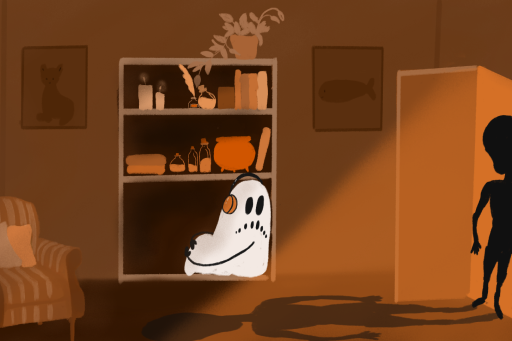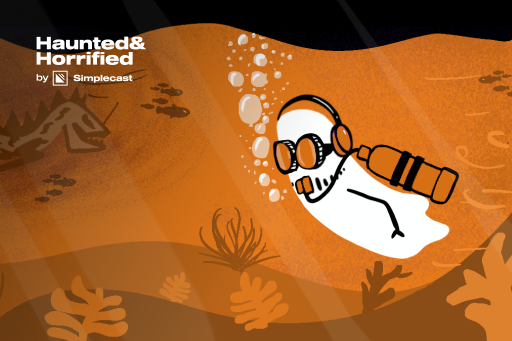Entertainment
Related articles:
I’ve been a fan of audio fiction all my life, but it wasn’t until 2020 that I realized there was an active community of fans and creators on the platform-formerly-known-as-Twitter. I had just created my very first show, and was buzzing with excitement to encounter others who had made a home for themselves in this medium. In my quarantine days of endless scrolling, one audio creator in particular felt omnipresent on my feed.
Jordan Cobb shared, and was herself endlessly tagged in, posts showcasing affronts to Mother Nature, reason, and all that is holy.
If, say, some eldritch-looking killer jellyfish was unearthed from a dormant volcano – Jordan Cobb would be there, tagged in the comments, reveling in the sheer audacity of the thing.
If some potentially cataclysmic astrological anomaly was detected a galaxy or two away from ours, Jordan Cobb would be there in the comments, popping off like her team had just scored a game-winning goal.
Before even listening to a single show of hers, I had learned that Cobb was driven by a singular fascination with the unknown.
It’s never been so quiet. Dark. There's something about the press of absolute silence, the whole, consuming blackness that leaves me a little... I don't know... breathless?
Janus Descending, "Entry One - Chel"
Janus Descending is a limited series science-fiction/horror audio drama, the debut show of Cobb’s studio No Such Thing Productions, and one of my favorite horror stories in a medium absolutely brimming with stellar entries into the genre. The story follows two xenoarchaeologists conducting an expedition on a small and uncharted world orbiting a binary star. Hearing the logline and genre, noting the whiff of the lost alien civilization, a prospective listener might think they know exactly where the story is headed.
Horror is, after all, the home of unhappy endings. It is a vehicle for tragedy, of horrible things that happen to heart-wrenchingly flawed people. I’d be the first to admit that I struggle with horror for exactly this reason – in a real world as densely packed with tragedy as ours is, I find my bandwidth for rude shocks in my fiction experiences to be somewhat limited.
This is perhaps why it is so surprising that Janus Descending lays all its cards on the table from the moment it starts. It presents journal entries from each scientist in chronologies that run opposite to each other: one forwards, and one backwards from the very end of the story.
The show immediately affirms that these two people will, in fact, meet a grisly end… and then invites you to fall in love with them anyway.
“Love” really is the operative word. Chel and Peter are immediately likable characters. Chel’s monologue in the first episode does a remarkable job of establishing the human elements at play in the series: an earnest sense of awe amidst the abject horror of space, an intense desire to learn and experience things no other person yet knows, and a so-clumsy-it-hurts dynamic between two scientists whose fascination with the unknown extends to each other.
Enough praise cannot be heaped on the feat that Cobb pulls off in directing, writing, and starring in a show whose success hinges entirely on the dynamic of just two characters. This is where one feels Cobb’s theater background comes across most strongly, moving between lyrical monologues and dialogue-driven set pieces laced with double entendre, hidden yearning, and sizzling wordplay. Every facet of the production draws you deeper in love with these characters, and this is entirely by design.
Just when you catch a smile forming at the edges of your lips, sitting a little too comfortably, the show jerks you back into a nauseating awareness: you already know this will end horribly.
That’s the trick, though – we smile regardless.
In all of my work, what I want to convey is a sense of awe and wonder at the world around us – not just the bright and beautiful things, but also the things that are dark, and ugly, and terrifying. [...] Because, even in the absolute worst moments, you can look up at the sky and see the stars.
Jordan Cobb, on Primordial Deep for Radio Drama Revival
Following the massive and well-deserved acclaim for Janus Descending, Cobb decided to double down on her burgeoning sci-fi universe with Primordial Deep.
This new show explores a different corner of the same world, with the same familiar and vaguely insidious corporate players lurking in the background, but which otherwise is a standalone story with a fresh cast of characters. Its ties to Janus Descending, then, mainly lie in its thematic concerns and sensibilities – chief among them, its interest in exploring the unknown.
Janus Descending, for its part, really sits with the vastness of space. In its prologue episodes, set before the events of the show, Chel and Peter grapple with the unimaginable scale and accompanying uncertainties of their upcoming space voyage. In the show’s opening monologue, Chel is forced to confront the fact that with each passing second, she is the furthest from home she’s ever been, occasionally inching towards the stern just to be slightly closer to it. Still, she enthusiastically jumps at the chance to be on this mission, one which she knows could, and eventually does, destroy her.
Her voyage into the unknown is at once insurmountable, terrifying, and utterly irresistible. This drive to discover remains the focal point of Primordial Deep, as Cobb shifts this show’s dramatic focus, and area of intense fascination, to the deep sea.
A distant shoreline is as confounding and inexhaustible a sight as a starry night. It lies beyond the capacity of a human brain to fully comprehend, but seems so within reach that we can’t help but try. Fittingly, the show opens with two characters, Marella and Kiran, standing by a beach, reflecting on the all-too-thin line it presents between the ‘normal world’ and the unknowable.
In old European maps, regions unknown to the cartographer were populated with imagined beasts and dragons, accompanied in at least one instance by the phrase “here be dragons!” With the march of colonization and commerce, these illustrations were replaced by those of realistic merchant ships. As Hannah Waters wrote for The Smithsonian Magazine, “some of the mystery is gone as the sea becomes another resource rather than a churning darkness to be feared”.
In 1971, theorist Max Weber wrote about the idea of “disenchantment”, broadly referring to the march of Western society towards a detached, bureaucratic, and modernized way of relating to the world. Put another way: “disenchantment” represents a distancing from our immediate experiences. One sees traces of this in Kiran, the representative of an organization with seemingly limitless resources and a callous disregard for life in all its forms. For all his grand gestures towards the importance of the upcoming expedition, he is more than happy to remain safely on shore.
A decade later, historian Morris Berman wrote a response to Weber titled “The Reenchantment of the World”. The book questions Weber’s characterization of the natural world as something to be understood through the scientific method alone, and looks to the holistic traditions which were lost in its wake, Rather than mere “observers”, the reenchantment position argues for an understanding of ourselves as participants and explorers with an intimate connection to the world around us. Going one step further, he argues that a “reenchanted” view is a necessary step to safeguard against the destruction of both our climate and modern society.

When I think about Marella stepping out to sea from that beach, or Chel gazing out the window into uncharted space, I think about Berman’s argument for the necessity of wonder. The idea that “the unknown is the source of all horror” has been bandied about countless times, but what are we without the active recognition of the unknown? What are we without that sense of awe, and the recognition that the potential for greater evils in the world includes the potential for goods greater than we could possibly imagine?
The reason I love Cobb’s work so dearly is that it makes the world – the real world, the one we live in – feel just that little bit bigger. In an expanse of space beyond our reckoning, alongside alien malice we have no hope of contending with, her work can make you believe in a depth of love we’d all be lucky to experience a fraction of. In the deepest reaches of the open sea, alongside time-displaced abominations, she managed to portray one of the most powerful and radically inclusive found-families in this medium so far.
In this way, Jordan Cobb does something that I’ve only ever seen my favorite horror creators do: she shows just how beautiful our world can be, how stellar people can be, by refusing to compromise on its darkness.

